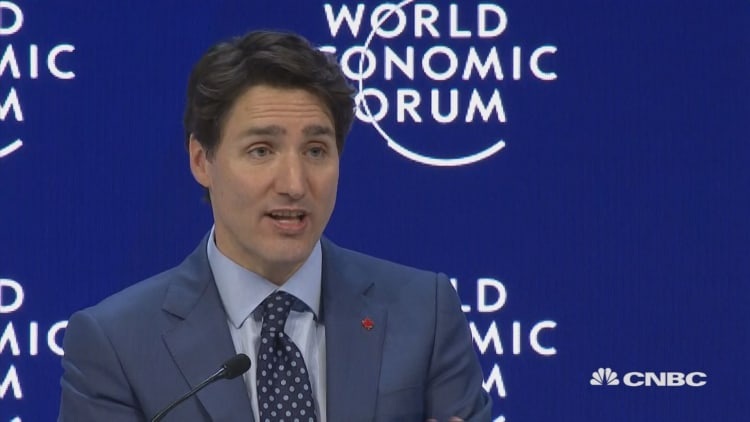World leaders speaking at the World Economic Forum in Davos have made it clear that they disagree with the anti-free trade rhetoric coming out of the United States.
Without always naming the United States, the heads of state of Brazil, India, Canada and Italy all said they disagree with what they believe is an anti-free trade stance from the world's biggest economy.
"We know all too well that we live in a world where isolation trends are gaining ground, however, we all know that protectionism is not a solution," Michel Temer, the Brazilian president, told an audience in Davos, Switzerland on Wednesday.
"When we are closed within ourselves, we are closed to new technologies, we are closed to new ideas, to new possibilities and we therefore remain closed to actual effective solutions to our shared problems," he added.
President Donald Trump, who will address the Davos audience later in the week, has been a vocal advocate against multilateral trade, criticizing many of the country's partners for supposedly taking advantage of the United States.

Speaking to CNBC at the Forum, Italian Prime Minister Paolo Gentiloni, said that it is understandable that the U.S. wants to look out for the interests of its people, but the discussion about trade fairness needs to take place in a framework of openness.
"We, the Europeans, we, the Italians, have to stress the fact that respecting and protecting the interest of the U.S. citizens, which is correct, cannot mean that we discuss the framework of the internationals trade relations, for example, that demonstrated to be so useful for growth," Gentiloni told CNBC Wednesday. "We have to mix, obviously, free trade and fair trade," Gentiloni added.
The White House Chief Economic Advisor Gary Cohn told reporters Tuesday that Trump will deliver a message of openness to investment in America and "remind the world that we are open for business."
Also on Wednesday morning, top U.S. officials trumpeted America's commitment to free and fair trade at Davos. Treasury Secretary Steven Mnuchin iterated that his country is "absolutely" committed to free and fair trade. He added that strong U.S. growth was good for the economy and that there was no inconsistency with Trump's "America First" agenda, according to the Associated Press.

But at the same time, the U.S. has closed its doors to an agreement with 11 other nations in the Asian-Pacific region. This strong pro-trade talk comes one day after the 11 countries abandoned by the United States — when it left the Trans-Pacific Partnership (TPP) — sealed an agreement to move forward with their own free trade deal. The U.S. has also stopped trade negotiations with Europe and it is still assessing whether to strengthen trade ties with Canada and Mexico.
Speaking at Davos on Tuesday, Canadian Prime Minister Justin Trudeau said: "We are working very hard to make sure our neighbor to the south recognizes how good NAFTA (the North Atlantic Free Trade Agreement) is and that it has benefited not just our economy but his economy and the world's economy."
Also on Tuesday, Indian Prime Minister Narendra Modi noted the current "worrying trend" against globalization.
"Forces of protectionism are raising their heads against globalization, their intention is not only to avoid globalization themselves but they also want to reverse its natural flow," he said.
"The solution to this worrying situation against globalization is not isolation. Its solution is in understanding and accepting change and in formulating agile and flexible policies in line with the changing times," he added.






